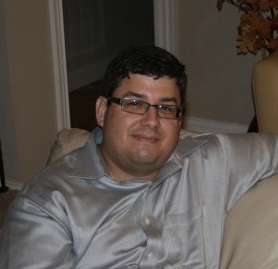I have written a lot recently on my experience with caregiving and death both at my first blog and then the subsequent one on how to slowly wake up and live after the death of someone close to you.
But today I want to write about something else: how this experience impacts a child. I am not a child psychologist, but I can relate my own experiences and those of my son and show how it scarred and molded him, how he learned from it and, finally, how he now flourishes.
My son was 5-years-old when my wife’s cancer was diagnosed. I remember clearly the day that I took her to the hospital because her voice was slurring. He brought some of his toy cars and sat on the floor in the ER room and played, completely oblivious to the nurses coming in and out. Joan and I sat nervous and tense, trying to reassure each other, but also wanting to say as few words as possible. We knew something was wrong right away after her CAT scan because the nurses, who had been joking that she probably just had a migraine, suddenly disappeared.
The horrors of that day come back to me with an intensity that sometimes even now feels like I’m being punched. The doctor came in with apologetic eyes and told us that Joan had a large mass in her brain and that she needed to be transferred to another hospital right away and that they were ordering an ambulance to take her there.
Our son must have sensed something because he stopped playing. I remember him looking up and studying my shocked face and my wife’s impassive face – her “game face” that she put on when the news was grim. He stared for a few minutes and then began playing again.
Things then moved very quickly. Joan told me calmly (she was always calm) to go home and get a couple of changes of clothes and call my family and hers and then meet her at the other hospital. I took our son and left the hospital immediately, I remember walking like a zombie to the car before calling my parents and informing them of the issue. They told me they would leave immediately to come and help. I then got off the phone and broke down – it was the first time my son had seen me cry and I know to this day it was deeply traumatic for him.
First, he tried to comfort me by rubbing my shoulder and then my cheek in his 5-year-old manner, and then finally he also began crying. I think his crying was what snapped me out of the hole I was in. I cleaned myself up and called her family to let them know. Sadly, 24 hours later her father would have his first in a series of strokes, no doubt because of the stress of the situation.
Within 24 hours of Joan’s transfer to the new hospital she was on tons of medications and the doctors were talking to me about immediate surgery. Our son witnessed it all. I still remember his bewildered expression at all the hubbub. He could not understand why he couldn’t climb up into the bed with his mother. Equally traumatic was the fact that once my parents arrived they took over his caretaking and kept him occupied. But knowing that there was something wrong with your mother and not being allowed to see your father either was very hard for him.
It would take Joan the next 6 months to recover from having a golf-ball sized tumor removed from her brain. During that recovery time she was not allowed to do anything except sit-up and read and write and could move only short distances. So my son had the added trauma of seeing his mother with a huge suture line across her head and going from having long hair to being bald. For months after the surgery I remember him walking through the house carrying a small picture of Joan, one in which she had her very long hair. It was also hard for him because up until that point his mother had been very active in his life, playing and running and jumping outside. Suddenly she was not able to do any of those things. And since I was responsible for caring for her, I also had less time to devote to him.
Over the 8 years of my wife’s illness until she passed away, I saw all the moods my son passed through. I knew them because I was experiencing them myself. Joan died in slow motion; we lost a little bit of her each year, never to be seen again.
I was asked once why I didn’t fall to pieces when she died, how I could be so stoic. And the simplest answer I can give is that I had 8 long, hard years to mourn each loss – mobility, energy, weakness, sickness, breathing without an oxygen tank. Each year I went through the stages of grief. When she passed, I had already given in to the inevitable as much as she had.
It was no different for my son. As those years passed I saw him become very sad and withdrawn at school and at home. He seemed uninterested in the things his friends were interested in. He devoted himself to hours of reading, sometimes reading the same book over and over again. I believe that he lost himself in books and could escape a little from the reality of his life. During other years I remember him getting into trouble, teasing, poking, and name-calling. That was the anger phase. His teacher talked to me about how he would pick up a stick during recess and find a tree or some other inanimate object and spend the whole time just beating the tree/object over and over again, working himself into a frenzy. But never once, during that period did he get into a fight with his classmates. He would tease them or do something mean spirited, but never crossed the physical line.
When he was in 6th grade or perhaps early 7th grade I remember he suddenly wanted to help his mother with things. She was wheelchair bound, but he would push her – or he would run and fetch things for her and worked hard to be helpful. I see this as his acceptance stage. He understood where things were going, and knew there wasn’t anything he could do about it. When Joan finally took the time to explain to him that she was stopping treatment and what it meant for her time left, I remember him crying for a long time and hugging her and saying over and over again, “it’s okay mama, it’s okay…”
It is easier as an adult in the sense that we understand the finality of it all. We talked about how I would raise him, we talked about mundane things like selling the house or what she wanted done with her stuff when she was gone. Although our son did not fully understand, he had come to accept it.
He was so brave the day that she died. He sat by her despite her not being awake and held her hand. He talked to her and told her it was okay to go – parroting the soft things I said to her as I sat by her. He was there fumbling for a pulse when her heart stopped. And he stood next to me during the Janazah funeral prayer and burial. He played her favorite violin song over the grave and works hard to always remember that song even as he learns new ones.
My son has become a teenager, and he is becoming an even better man. People like to give me the credit for this, stating that he has a good example in his father. I loved Joan and took care of her through all those horrors until the end…and perhaps there is some truth there, I do not know. God knows best.
But I know that he is deeply reflective, wanting to understand all the angles of an issue before deciding anything. I know that he is more empathetic then I ever was at that age, he will modulate himself to connect with a young girl and play with her; and then show politeness, deference and good manners towards adults twice his age.
Sometimes if the subject comes up I can still feel his scars from that period – they run along the same muscle tissue of my own heart, so they are familiar. I believe the experience hurt me a lot, but it also grew me in unexpected ways. For my son the same growth has taken place.
I love him ferociously. I do not hide things from him as he has already seen the worst of this world. It is this love and this open communication that I believe will bring us both through.
—
Read Alan’s past columns, here.
Alan Howard is an Engineer and Operations Manager at Cisco Systems Inc., where he has worked for the past 15 years. He lives in Atlanta, GA and enjoys kayaking, hiking and writing when he has the time and energy. You can read more of his writing at his blog Get Busy with Life and in the anthology Salaam, Love: American Muslim Men on Love, Sex & Intimacy.













